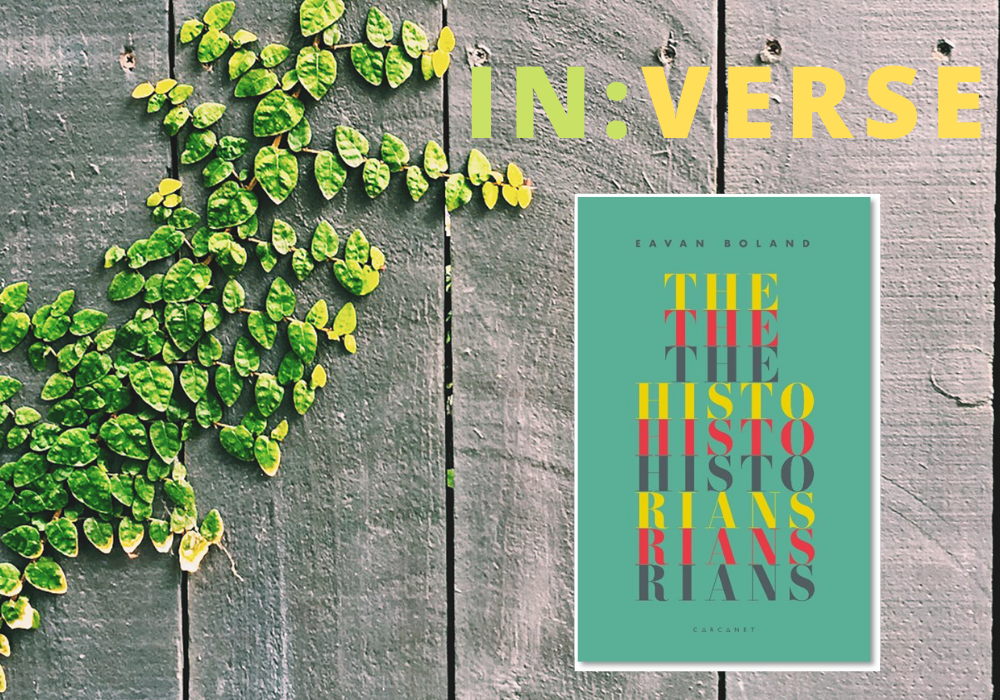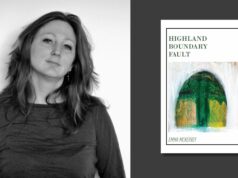
The Historians.
Eavan Boland | Carcanet | 69pp | pb ₤10.99 (€11.96 approx.) | 9781784109141 Forthcoming October 29th 2020
The poet Eavan Boland finalised and submitted the text of these poems before her death in April of this year. Some had previously appeared in various publications such as the New Yorker and Poetry Ireland Review (of which she was, not long ago, editor); one had been published as an illustrated booklet with six accompanying translations by the Royal Irish Academy in 2018.
But this is not a jigsaw of poems that have already appeared in numerous previous collections. The book lacks any biographical note—not a handicap in Ireland, of course, where Boland is well known, but it would be helpful to readers elsewhere approaching her outside of an Irish context. It’s nonetheless an odd absence from any poetry collection. The line spacing is set at 1.5, which, for this reviewer, seems rather wide, even if it makes the poems sit easy on the eye. Is there just the tiniest whiff of haste in the production?
Boland’s work became vital as a testimony to the power of women writing poetry—and women’s poetry—at a time when the socio-gender landscape of Ireland was changing. Broadly put, if Edna O’Brien had through her early novels managed to liberate women’s thought about themselves and their Ireland, Boland’s poetry followed quickly and took the Irish woman’s ordinary—even her domestic and settled urban—life onto a wider stage and invested it with an intellectual and artistic seriousness. While many of our younger generation of female poets, all of whom owe her a considerable debt, were still trumpeting with a sort of dark joy their alienation as poets in a male milieu, Boland had already leapt ahead of them beyond questions of identity, placing everyday women’s experience in the wider contexts of experienced history, even civic struggle. Boland’s friend Mary Robinson, in her inaugural speech upon election as Ireland’s president in December 1990, acknowledged the relevance of the poet’s intention artistique: ‘As a woman, I want the women who have felt themselves outside history to be written back into history, in the words of Eavan Bolan, “finding a voice where they found a vision”’. (1)
This is not to imply that Boland didn’t have her critics. The late Professor Lorna Reynolds, herself a poet and activist, had a go in her brief review-cum-essay, ‘Women and Ideas of a Nation’, in the journal Krino in the same year: in a review of A Kind of Scar: the woman poet in a national tradition (Attic Press) she took Boland to task for worrying about the ‘idea of a nation’ (Ireland) depicted throughout history as a grieving woman—a tradition that she (Boland) believed had ‘cut across her, both as a woman and a poet’. Reynolds found it ‘difficult to follow the reasoning here, to see how the personifying of the nation as a woman by male poets should so upset her’. And she went on to suggest that strong Irish women, from Queen Maeve to Alice Kyteler to Maud Gonne, should put paid to Boland’s view that Boland’s ‘lesson of Irish history’ is defeat.
For this reviewer’s part, I have been unable to uncover any such unsettling negatives in Boland’s work—or perhaps I didn’t ever look for them?—which is overall a vision of restrained liberation, however fusty national symbolism may have tried to intrude. By determining to have ‘ordinary’ women emerge as heroines of the everyday (as well as bigger players in a historic context) she provided a much-required momentum to women as poets, but also as themselves, the real poetry being intrinsic to their lived experiences. That said, though Boland highlights these themes in the present modest collection, it’s not quite so certain at times that this is entirely her best work. Her self-doubt as a poet is ably and plain-speakingly revealed in ‘Enough’:
I remember how I longed
to find the plenitude and accuracy needed
to ring words home,
to winter hills, fogged-away stars,
children’s faces fading into sleep …
The poem is settled in a section titled ‘Three Ways in Which Poems Fail’, which in itself is telling, and is part of a third section of the book entitled ‘Margin’. It’s difficult not to read a variety of ominous possibilities into this. In an earlier poem, ‘Anonymous’, in which the memory of a woman of considerable revolutionary heroism is introduced, she rounds off the vision with the contemplation:
Then I ask myself,
What is it I know?
The evening mist unfolds,
It is empty. That
is history. This
is only poetry.
There’s a despairing culminatory note to that, which, for want of a better word, is sad. One might ask how a poet who has raised a consciousness among women through her work for so long should come to question herself in such an apparently resounding way. Is poetry powerless, even irrelevant, and should it be compared to action? Is she being ironic? Who, exactly, is ‘anonymous’ here? One isn’t so sure.
In ‘Be’ the language is simplistic, which can be a virtue or a fault, and the whole reads rather as a note towards a more realised work. Or, of itself, a lament. In any case, the ending is unachieved, even weak, and a tad confusing to read:
All I know is
some days
should simply be.
Not be remembered.
Boland’s old fire still warms in the title poem, ‘The Historians’:
. . . . . . . . . . . Summon
Our island: a story that needed to be told –
the patriots still bleeding in the lithographs
when we were born. Those who wrote that story
labored to own it. [sic]
One might wonder why the American spelling of ‘laboured’ is used here. The next stanza is Boland at her most vigorous; two women, ‘your mother, mine,’ are burning ancient letters and notes, some of them her own:
But these are women we loved.
Record-keepers with a different task.
To stop memory becoming history.
To stop words healing what should not be healed …
… They lace their pages with fire. I finish writing.
Poetry and history gone up in smoke. The women burning the manuscripts may take on, to the reader, the form of guardians at an altar, and the papers offerings—to general history or to the poet’s contribution. There’s a poignancy here that is hard to avoid.
Boland died aged 75 of a stroke. She had arguably a great deal more to write and the times around her, Ireland changing at a dizzying pace, would undoubtedly have energised her work and even afforded new and challenging directions. This is an era in which more Irish women are writing and publishing poetry than ever thitherto, but few have Boland’s craftsmanship or intricate mastery of the weave and play of the simple and heart-deep experience of women with the greater mutating history of which they are a part. It is cliché and pseudo-speak to suggest that her poetry and vision gave women ‘permission’ to engage with Ireland, with their own history and the history of the nation at the same time, but neither is it entirely untrue. This modest collection is welcome and those who have not read Boland—few though they may be—will find here at least an introduction to her always-potent art. For others, it will serve as a coda to a poetic life well lived.
(1) Quoted by Molly O’Hagan Hardy, ‘Symbolic Power: Mary Robinson’s presidency and Eavan Boland’s poetry’ (New Hibernia Review, Vol. 12, No 3, Autumn 2008).












